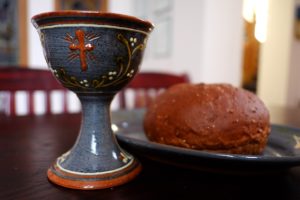 Several weeks into our enforced liturgical quarantine, our pastor appeared on the computer screen, sitting casually in front of a fireplace in the breezeway of her home. You could hear birds chirping and her children playing in the background.
Several weeks into our enforced liturgical quarantine, our pastor appeared on the computer screen, sitting casually in front of a fireplace in the breezeway of her home. You could hear birds chirping and her children playing in the background.
She reminded us that later in the live-streamed worship service we would observe the Lord’s Supper. Recognizing that congregants would not likely have the necessary elements on hand, she suggested that we use “what elements you have around you.”
Though I was an active participant in the “creative worship” extravaganza of the 70s, I have become more appreciative of tradition as I have grown older. Scrounging through our kitchen in search of something to substitute for the bread and the cup struck me as, well, trendy.
After all, according to Matthew, Mark and Luke, the meal Jesus shared with his disciples was the Passover meal. The wine and the bread had symbolic significance, recalling God’s deliverance of Israel from slavery in Egypt. You couldn’t substitute, say, goat’s milk and date nut loaf.

(Photo/Michael Kooiman/Creative Commons)
On the other hand, in John’s Gospel the last supper of Jesus with his disciples took place the night before Passover, which could mean that the bread and wine were not sacramentally intended; they were simply what they were going to have for supper that night. Thus, one might be justified, hermeneutically speaking, in substituting “what elements you have around you” for bread and the cup.
I don’t know if that is what our pastor had in mind, but it worked for me.
I hurried to the refrigerator in search of a liquid suitable to pass for the cup and found, to my consternation, only a gallon of 2% milk, some orange juice and back in the corner a quart of buttermilk. Nothing remotely suggestive of the wine Jesus served his disciples.
I closed the refrigerator, fearing that for lack of careful shopping I might become merely an observer at the Lord’s Table. That is when I saw on the counter next to the refrigerator a bottle of Napa Valley’s finest.
At this point, a little background is necessary:
I was reared in a conservative Baptist church where I was taught that the world was created in six 24-hour days because Genesis said so and that if the Bible said that an ass talked and an ax-head floated, by golly, an ass talked and an ax-head floated.
The Bible was to be interpreted in its most literal sense. Except where alcohol was concerned.
The wine Jesus provided at the wedding at Cana was nonalcoholic, I was told. He turned the water into wine on the spot; it didn’t have time to ferment. Following our Lord’s example, we were not to imbibe anything alcoholic – ever. Using real wine in the Lord’s Supper would have been unthinkable if it ever occurred to us; but it never did.
In college I began to drift leftward, and ultimately I came to believe that if you want to know the age of the universe you should consult your neighborhood cosmologist, not Genesis 1, and that asses don’t talk and ax-heads don’t float, no matter what the Old Testament says.
The Bible was not to be interpreted in its most literal sense. Except where alcohol was concerned.
Of course, the wine in the Bible was fermented. Paul did not admonish the Ephesians, “Do not become drunk with much grape juice.” Following our Lord’s example, we were free – encouraged, really – to celebrate all of God’s creation. In moderation, of course.
Curiously, this biblical interpretation, which was espoused by most of the clergy I knew, did not extend to the observance of the Lord’s Supper. Like most other Baptist pastors, we continued to fill tiny cups with Welch’s Grape Juice (which was invented by Thomas Welch for just that purpose) on communion Sunday.
So, there I stood in my kitchen staring at a bottle of red wine, a retired pastor twice over who had never observed the Lord’s Supper in a Baptist church with fermented fruit of the vine.
A slight tinge of guilt came over me at the mere thought of it. Not guilt that leads to repentance; more like guilt that causes one to feel slightly naughty.
Thusly did our household observe the Lord’s Supper with a dark red blend from California and leftover bread from a take-out meal ordered the day before from a nearby Greek restaurant that we are supporting during this plague that besets us.
We joined fellow church members at the Lord’s Table(s), a community scattered by a deadly pandemic but gathered, alone together, in hundreds of homes throughout the city, sacralizing the common things of life by making holy the elements we had around us.
“Thusly did our household observe the Lord’s Supper with a dark red blend from California and leftover bread from a take-out meal ordered the day before.”
The day will come when Christ’s scattered body will once again gather round an actual, not a virtual, table. It will be a joyous celebration of the simple presence of sisters and brothers in Christ. We will greet one another with a holy hug and laugh the laughter of the redeemed. We will break bread and share the cup, perhaps with the prayer of ancient Christians:
“As this broken bread scattered on the mountains was gathered and became one, so too may your Church be gathered together from the ends of the earth into your kingdom” (Didache 9:4).
Read more BNG news and opinion on this topic:
#intimeslikethese
